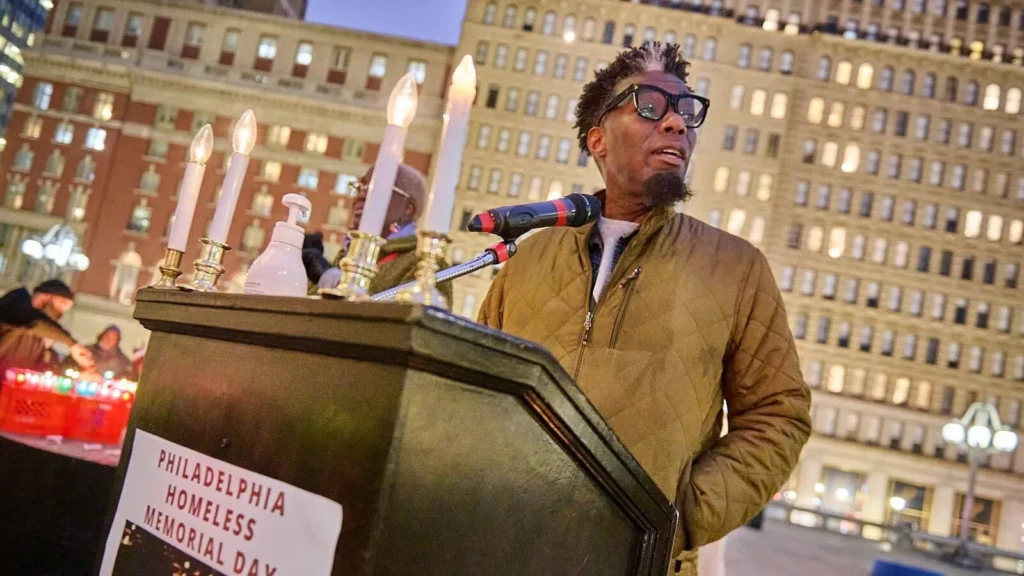Alejandro Morales: What was your process like for writing this show?
R. Eric Thomas: The theme of the show is “making connections” and I looked at things through the lens of the internet. Facebook is so important in my life — and I feel childish saying that, but it is. It’s important because my relationship with my brother is better because we are Facebook friends. I’m not a phone person. I don’t pick up the phone. I’m constantly thinking of other people, because I’m wonderful, but I’m not always making that leap. So Facebook, and the internet in general, bridges the gap. And so I looked back at my history, at every profile I’ve ever created.
AM: MySpace, DList…
RET: Anything. Everything. Find Fred.
AM: “Find Fred”?
RET: I got a postcard for it somewhere, and I logged on.
AM: What is that about?
RET: I don’t know. I didn’t find him. I was unable to locate Fred. I think that was the litmus test, there. So I was looking through these profiles, and they were all trying to say the same thing: “This is who I think I am right now. Are you okay with that? Do you like me?” And I thought that was pretty powerful. Facebook for me is like the closest facsimile to what real life is. I wanted to look at where I am now, and the beginning of it, when I first got on the internet in 1993 when I got on Prodigy. It was just a black screen, like beep boop beep boop. Like Sandra Bullock in The Net. So the show is basically four stories and a few interludes, and the stories are about ways that I’ve failed to make connections, ways that I was maybe disingenuous, and ways that I succeeded.
AM: Disingenuous in the sense of always putting your best foot forward?
RET: That, and ways that I misrepresented myself, purposefully. I tell one story where, through an unfortunate series of events, I was mistaken for a white racist. It got out of hand so quickly. I got hate mail. It was insane stuff. And all because of something I had put on the internet.
AM: Regarding the way that people represent themselves on Facebook, do you think people project more often how great things are going, and less often how they’re falling short?
RET: People use Facebook in so many different ways. I love the people that argue with their boyfriends on Facebook. I’m friends with two people specifically because they have fights on Facebook, and they’ll write things like, “Come back, Joe. I didn’t actually call the police.” And that shit drives me crazy. I love it. I mean, I definitely put up pictures and check in places because I want people to be jealous of my life. If I’m eating a good meal, you need to see it.
At the same time — Yesterday, I walked by this barber on Chestnut Street. And this guy says, hey, come in here player and let me fix that face for you. I hadn’t shaved. And it made me feel some kind of way. So I immediately got on Facebook and reiterated that exchange, but with my internal monologue, where I was internalizing the sales pitch and reading too much into it, and looking for the next bakery. So that’s me projecting neuroses.
AM: What do you think of the instant gratification element to Facebook? The expectation that you’re going to write something and get results instantly. Do you think that it’s value-neutral, or do you think it’s a negative thing, or —
RET: I think it’s a good thing. I think like anything it can be abused. Performers need laughter, need applause. When I put something on Facebook, usually it’s a joke, as opposed to “I’m at the coffee shop and I’m having a great sandwich.” So I do pay attention to how much people like it. It’s a boost. It’s an affirmation that I’m not the only one who thinks this.
AM: So speaking of people’s reactions, lately you’ve been branching out from storytelling to comedy events. Do you feel a pressure to be funny now? Because your stories are never just funny stories, there’s a lot of heart to them.
RET: I’ve been so anxious about the comedy thing the last couple months. Stand-up comedy was hard for me, because I feel like, in stand-up comedy, the joke is the problem, not the solution. In a story, it’s not necessarily about a solution, but it is about resolution. For me, coming away from stand-up gigs, I felt like a therapy session had gotten cut short.
AM: You did a show with NYC comic Kelli Dunham. Tell me about it.
RET: That was an amalgam of stand-up and storytelling. I did maybe seven minutes of just jokes, about Grindr, about meeting people from Craigslist. All charming things that you could talk to your mother about. And then I merged into a story about my family, oddly enough, and the audience loved it. Kelli is a great host and it was such an honor to perform at Stonewall. I really felt like I came into my own that night, in comedy.
AM: How did you get hooked up with First Person Arts?
RET: I started telling stories with them about four years ago. I went to a Slam. It was a sort of dark period of my life. I wasn’t happy, I wasn’t artistically productive, and I just told a story about how unhappy I was, and I won. I was surprised. It was the first time I really felt like I was allowed to speak and express a different part of my identity. I got on stage at L’Etage in front of a very Main Line, Society Hill audience, and I said, “Like most of you, I grew up poor and black in Baltimore.” And I immediately felt at home. And, during the course of my personal development over the last four years, more stories have come out. So when the opportunity came to pitch First Person Arts a show, I felt like it was the right thing to do, for me to move forward artistically. They’ve been very supportive.
R. Eric Thomas’ one-man show, Will You Accept This Friend Request?, runs Nov. 14th and 15th at Khyber Upstairs. Tickets and more information available at FirstPersonArts.org. You can read one of his stories here.






